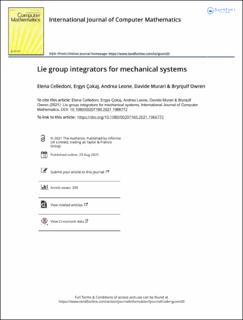| dc.contributor.author | Celledoni, Elena | |
| dc.contributor.author | Çokaj, Ergys | |
| dc.contributor.author | Leone, Andrea | |
| dc.contributor.author | Murari, Davide | |
| dc.contributor.author | Owren, Brynjulf | |
| dc.date.accessioned | 2022-05-09T14:47:44Z | |
| dc.date.available | 2022-05-09T14:47:44Z | |
| dc.date.created | 2021-08-11T16:39:26Z | |
| dc.date.issued | 2021 | |
| dc.identifier.issn | 0020-7160 | |
| dc.identifier.uri | https://hdl.handle.net/11250/2994862 | |
| dc.description.abstract | Since they were introduced in the 1990s, Lie group integrators have become a method of choice in many application areas. These include multibody dynamics, shape analysis, data science, image registration and biophysical simulations. Two important classes of intrinsic Lie group integrators are the Runge–Kutta–Munthe–Kaas methods and the commutator free Lie group integrators. We give a short introduction to these classes of methods. The Hamiltonian framework is attractive for many mechanical problems, and in particular we shall consider Lie group integrators for problems on cotangent bundles of Lie groups where a number of different formulations are possible. There is a natural symplectic structure on such manifolds and through variational principles one may derive symplectic Lie group integrators. We also consider the practical aspects of the implementation of Lie group integrators, such as adaptive time stepping. The theory is illustrated by applying the methods to two nontrivial applications in mechanics. One is the N-fold spherical pendulum where we introduce the restriction of the adjoint action of the group SE(3) to TS2, the tangent bundle of the two-dimensional sphere. Finally, we show how Lie group integrators can be applied to model the controlled path of a payload being transported by two rotors. This problem is modelled on R6×(SO(3)×so(3))2×(TS2)2 and put in a format where Lie group integrators can be applied. | en_US |
| dc.language.iso | eng | en_US |
| dc.publisher | Taylor and Francis | en_US |
| dc.relation.uri | https://doi.org/10.1080/00207160.2021.1966772 | |
| dc.rights | Attribution-NonCommercial-NoDerivatives 4.0 Internasjonal | * |
| dc.rights.uri | http://creativecommons.org/licenses/by-nc-nd/4.0/deed.no | * |
| dc.title | Lie Group integrators for mechanical systems | en_US |
| dc.type | Peer reviewed | en_US |
| dc.type | Journal article | en_US |
| dc.description.version | publishedVersion | en_US |
| dc.source.journal | International Journal of Computer Mathematics | en_US |
| dc.identifier.doi | 10.1080/00207160.2021.1966772 | |
| dc.identifier.cristin | 1925415 | |
| dc.relation.project | EC/H2020/860124 | en_US |
| cristin.ispublished | true | |
| cristin.fulltext | original | |
| cristin.qualitycode | 1 | |

